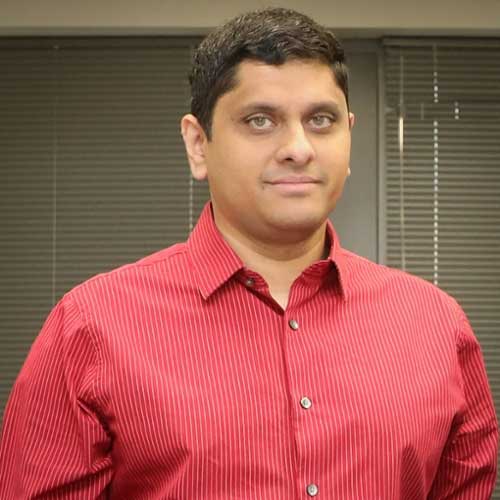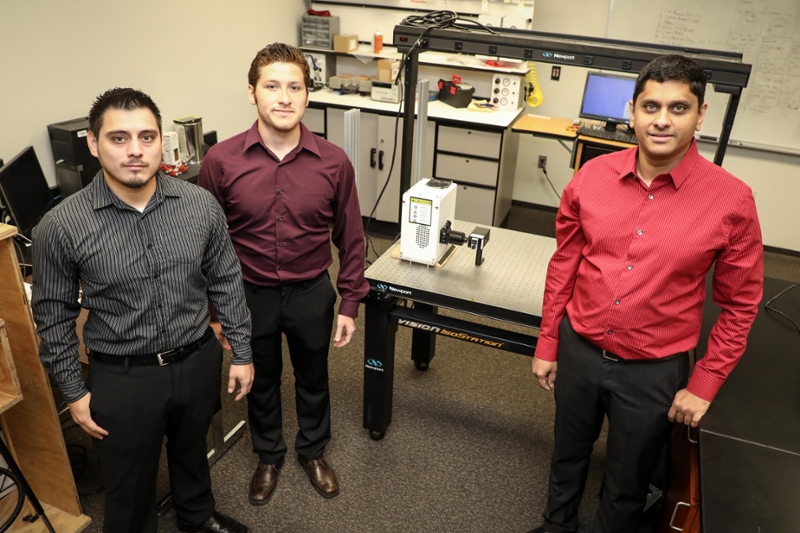Research gets TAMIU International Recognition for Key Scientific Article from 'Advances in Engineering'

Cheaper and more effective solar cells could be possible in the near future thanks to a group of scientists from Texas A&M International University (TAMIU) and local plants.
Their research article, “Dye-sensitized solar cells using Aloe Vera and Cladode of Cactus extracts as natural sensitizers” was published in “Chemical Physics Letters,” Volume 679, July 2017, recently recognized by a leading source of engineering research news, Advances in Engineering, and recognized as a key scientific article contributing to excellence in engineering, scientific and industrial research.
Main author Dr. Deepak Ganta, assistant professor of engineering, TAMIU College of Arts and Sciences School of Engineering, worked with two undergraduate students, José Jara (Senior/Systems Engineering) and Rolando Villanueva, (Senior/Systems Engineering), enrolled in the School of Engineering.
“We were the first group to develop solar cells from aloe vera and cactus plants grown in Jara’s backyard,” explained Dr. Ganta.
“My motivation was to develop solar cells with aloe vera and nopal plants found in my home garden, as they can withstand direct sunlight. The experiment was successful, and I learned that it is possible to use these plants to generate green energy, providing a cleaner and healthier environment for generations to come," explained Jara.
“Further research and implementation may one day lead to positive climate change, cleaner air and water, lower health risk, and many other benefits,” Villanueva said.
They developed a simple and inexpensive method which can be used to make dye-sensitized solar cells from two types of natural plant-based dyes, extracted from a leaf of aloe vera and cladode. The aim was to develop dye-sensitized solar cells using those extracts as natural sensitizers.
According to Dr. Ganta, the use of natural plant-based dyes as sensitizers of dye-sensitized solar cells is promising because of their low production cost, environmental friendliness and the simple and energy efficient assembly method.
“We look forward to publishing more high-quality interdisciplinary research papers which can draw national/international media or scientific organization attention,” he said.
Advances in Engineering strives to alert the scientific and industrial community to "innovative papers or top patents considered to be of importance to the progress in Engineering technologies," via its website, which is visited nearly 650,000 times each month.
“This kind of acknowledgment encourages undergraduate students to think the unthinkable when they publish in top journals, get awarded while competing with graduate and post-doctoral students from top research schools,” he added.
“We would like to thank the TAMIU undergraduate research programs, Quality Enhancement Plan (QEP) ACT on IDEAs, and Title III-SYSTEM Program for their support,” said Ganta.
The article is available at sciencedirect.com/science
Advances in Engineering can be visited at: advanceseng.com
For more information, contact the TAMIU Office of Public Relations, Marketing and Information Services at prmis@tamiu.edu or 326.2180 or visit offices in Sue and Radcliffe Killam Library 268.
University office hours are 8 a.m. - 5 p.m., Monday - Friday.
Additional information is also available at tamiu.edu
Rolando Villanueva and José Jara, both TAMIU seniors (systems engineering) and TAMIU Assistant Professor of Engineering Dr. Deepak Ganta published an article on their research on using aloe vera and cactus plant extracts to generate green energy.

